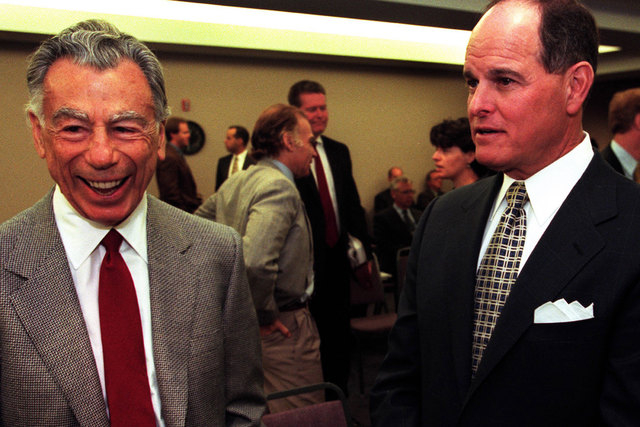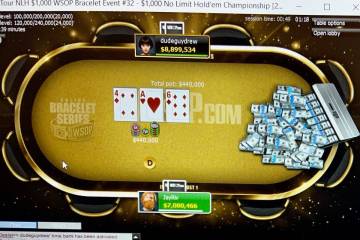Even after death, Kerkorian’s legacy through Tracinda will wield influence
At some point, the estate of Kirk Kerkorian will no longer have ownership in MGM Resorts International.
But disposing of more than 91.2 million shares in the casino giant won’t happen overnight.
Kerkorian, who died June 16 at age 98, left instructions that Tracinda Corp. — his Los Angeles-based holding company — “execute an orderly disposition” of the company’s MGM shares. No time frame was given.
In a filing with the Securities and Exchange Commission on the day Kerkorian died, Tracinda stated “there is substantial value in the assets of MGM Resorts and that the company is a good long-term investment.”
Tracinda made clear it’s not jumping on the first offer.
The sale will be supervised by Tracinda CEO Anthony Mandekic, 73, who was Kerkorian’s close friend and confidant, and is also an MGM Resorts board member.
He was named executor of Kerkorian’s estate and is awaiting court approval to handle the duties.
Kerkorian, the Los Angeles billionaire and philanthropist, founded MGM Resorts in the 1990s. It was the second time he brought the name MGM to the Strip. Over the years, Kerkorian reduced his majority stake in the company. He retired from its board in 2011, becoming a senior adviser.
By 2009, his shares had shrank from 54 percent to 37 percent.
Still, Kerkorian was legendary for his maneuvers that often moved the needle on the value of MGM Resorts.
In 2007, as the recession began to weigh on MGM’s under-construction CityCenter project, Kerkorian — through Tracinda — offered to buy the development along with Bellagio. The deal went nowhere but MGM saw its stock price jump 16 percent on the day the news broke.
At the time of his death, Kerkorian’s Tracinda was MGM’s largest shareholder with a 16.2 percent stake.
As of Tuesday, Tracinda’s shares are valued at $1.66 billion, based on a closing price $18.25 on the New York Stock Exchange.
Tracinda believes its MGM shares are worth much more.
Analysts said the investment community has yet to take into account the company’s $1.25 billion hotel-casino complex under construction in Maryland and an $800 million project in Massachusetts. MGM Resorts is also expanding its footprint in Macau through a $2.9 billion development on the Cotai Strip.
Nearly two months before his passing, Kerkorian voiced his support for MGM. The company faced a proxy fight from a small investor seeking to convert a portion of its holdings into a real estate investment trust. Tracinda said in April it was backing management and told other shareholders to reject the offer.
“We are very confident that the current board and management team are committed to — and more than capable of — evaluating all avenues to deliver sustainable value,” Tracinda said in a statement.
Most analysts believe Mandekic is in the game for the long haul. A spokesman for Tracinda said Mandekic wasn’t commenting beyond the SEC filing.
MGM Resorts officials won’t talk publicly about the potential actions of a company shareholder.
During MGM’s annual meeting in May, Chairman and CEO Jim Murren responded to shareholder questions concerning stock repurchases and the awarding of dividends. He said those activities weren’t on the company’s agenda. MGM is not interested in adding to its long-term debt of $14.5 billion.
That answer indicates MGM isn’t in a position to buy back Tracinda’s shares.
So how does the stock sale take place?
“We see a number of ways or mechanisms that could be used to divest the shares,” said Union Gaming Group analyst Christopher Jones.
One vehicle Tracinda expressed would be an SEC-sanctioned 10b5-1 trading plan that protects the company from any worries of insider trading. Tracinda would announce specific trading windows in which it would divest a certain number of shares. That plan would also eliminate any investor concerns that might overhang the stock price.
For now, there is zero guidance on how or when a stock sale would happen.
Any speculation on prospective buyers of the stock would be pure conjecture.
MGM Resorts is primarily owned by institutional investors. Much of the company’s competition has large individual investors. For example, Las Vegas Sands Corp. is more than 50 percent controlled by Chairman Sheldon Adelson.
According to Bloomberg, T. Rowe Price Associates Inc. is MGM Resorts’ next largest institutional shareholder after Tracinda with almost 67.6 million shares, or a 12 percent stake. Capital World Investors has 63 million shares, or 11.23 percent.
Meanwhile, Dubai World — MGM Resorts’ 50-50 partner in CityCenter — has a 4.6 percent stake, or 23 million shares. Hedge fund giant John Paulson, once MGM’s second-largest investor, now owns just 1.1 percent of the company.
Kerkorian loomed large over MGM Resorts in life. It appears his legacy through Tracinda will continue to have influence.
Howard Stutz’s Inside Gaming column appears Wednesdays and Sundays. He can be reached at hstutz@reviewjournal.com or 702-477-3871. Find on Twitter: @howardstutz




























